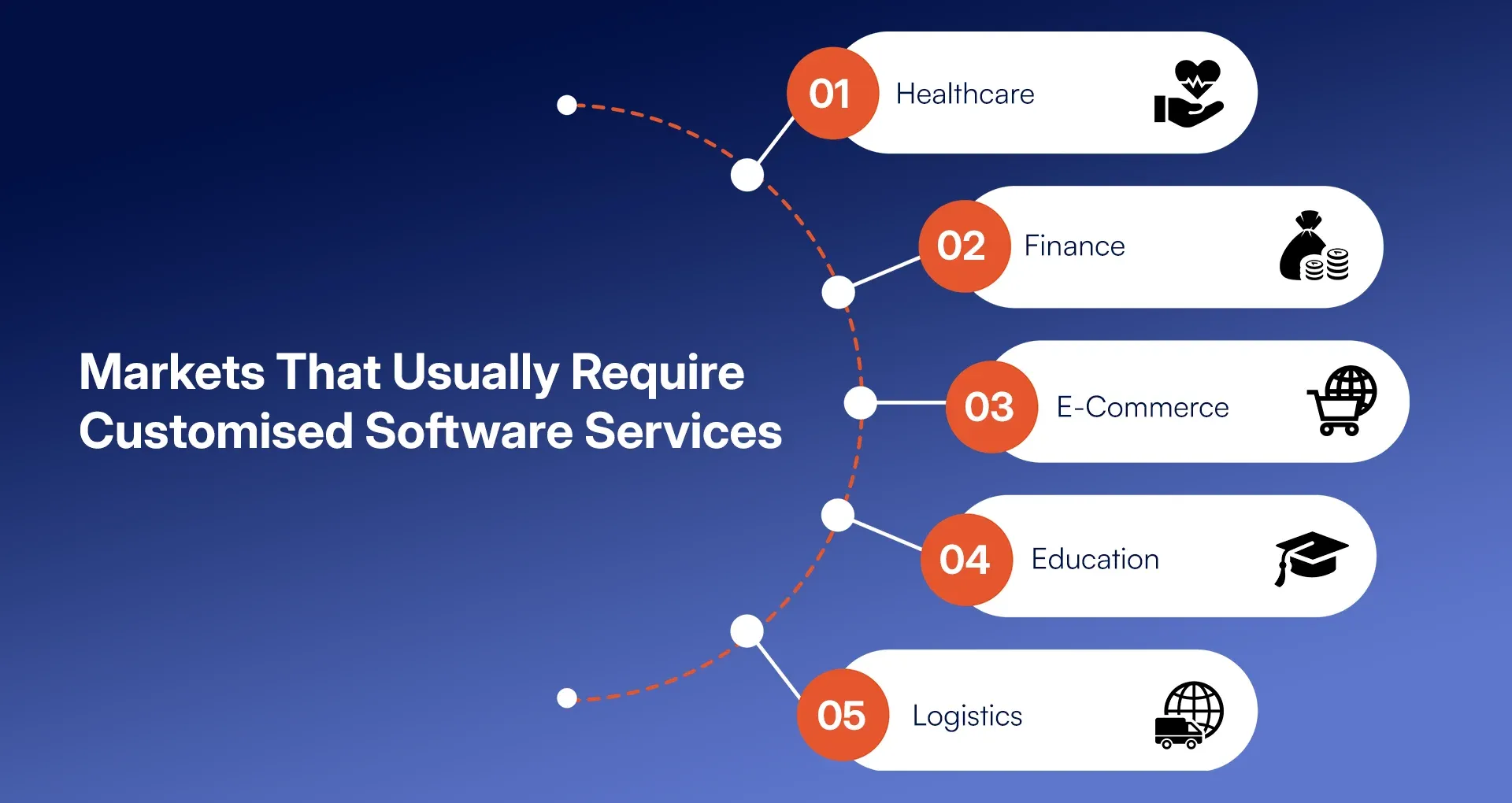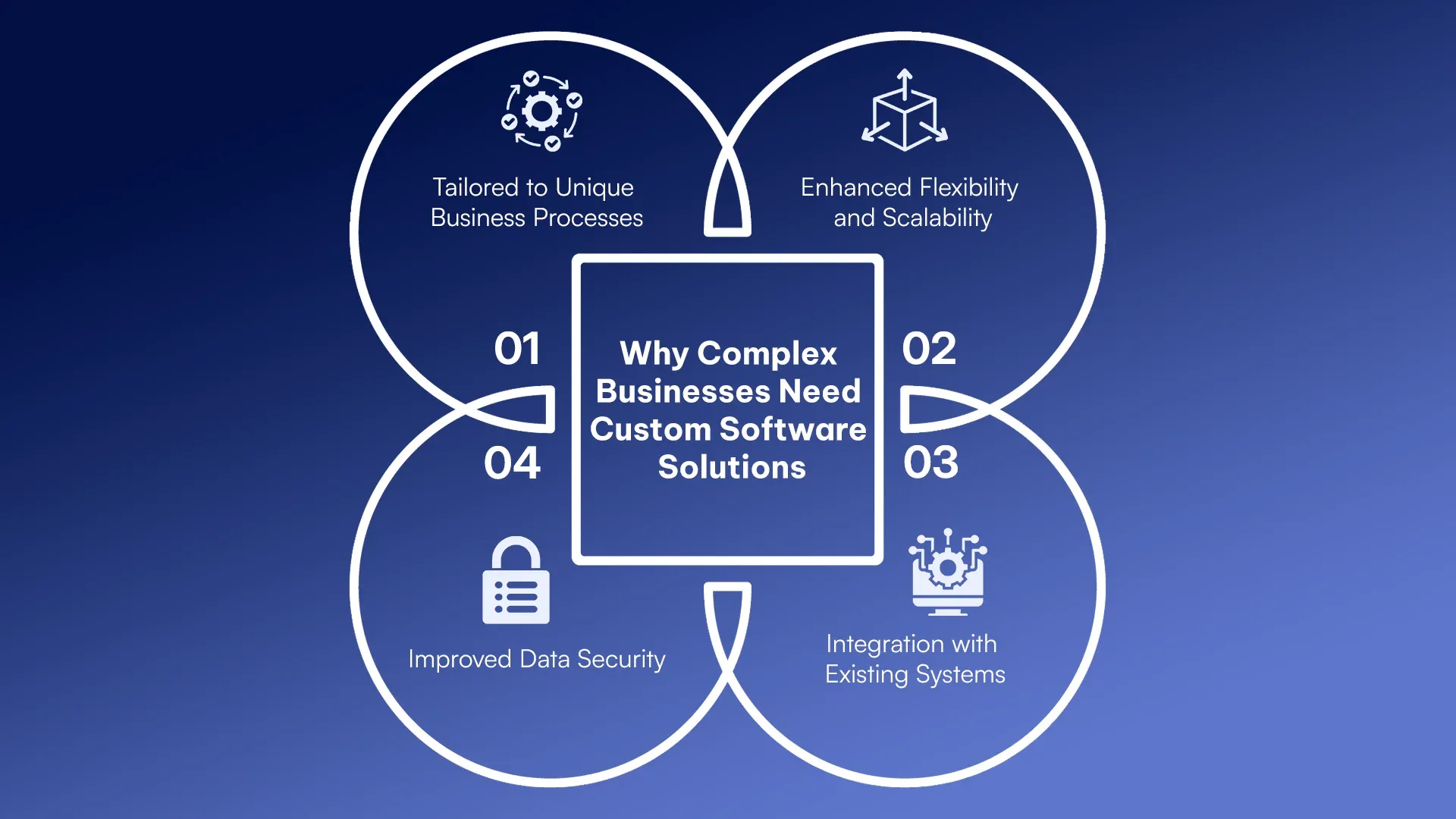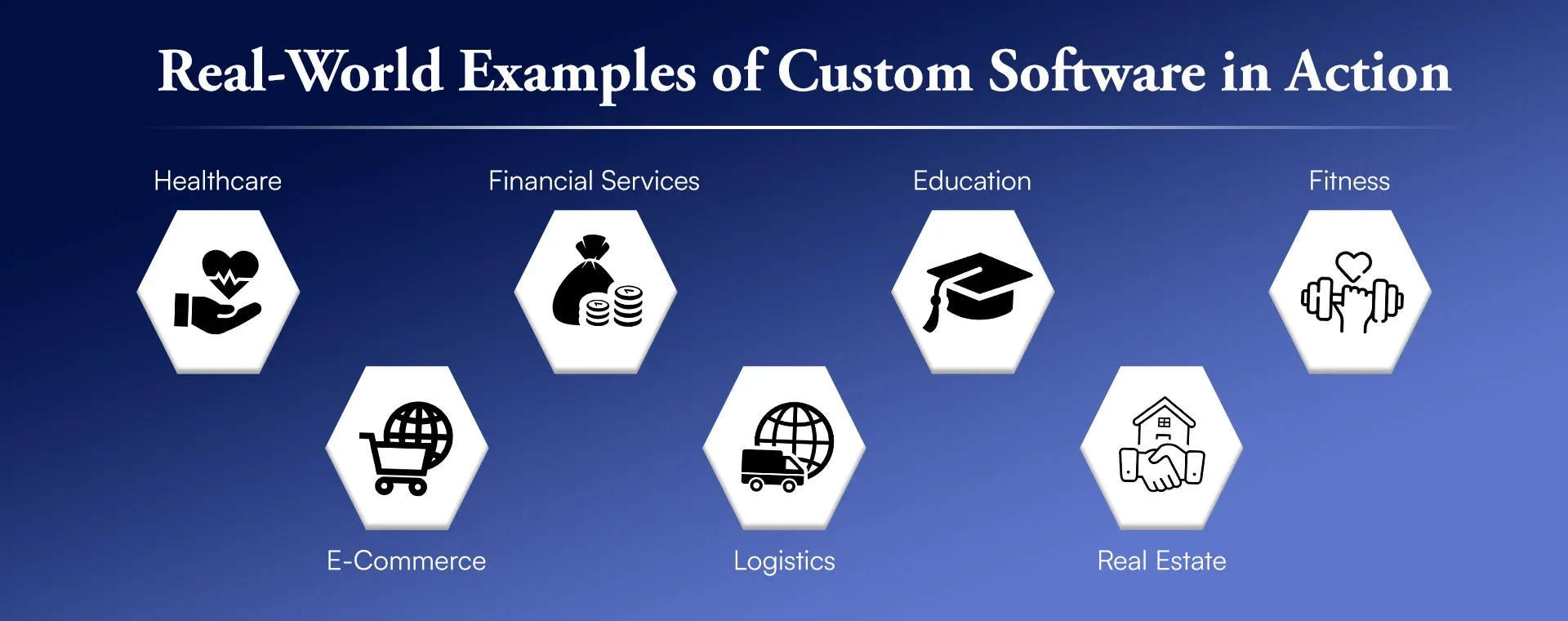Custom Software Development: Solutions for Business Challenges

Vishv Desai
I am a technical content writer
The business environment is evolving rapidly, organizations are faced with various challenges that call for creative solutions almost all the time. To the contrary, as we all know, new request systems are not birthed with new potential; they are added on top of the existing ones, which is often more complicated than the existing situation. When this happens, the typical software solutions are often customizable to an extent but are unable to solve the problem at hand entirely creating in turn room for inefficiencies and waste in operability. Custom software development is therefore one of the important solutions.
Custom software development is an adaptive application development process just for a specific business in the sense that it produces features that are in coherence with its operations. While mass-market applications can largely be seen as software designed for many people, which utilizes efficient methods, such methods, and software have no real place in business where there are specific core functions that must be dealt with. This blog explains custom software development advantages, and basic cases on the level of real life, and advises on the appropriate software development company.
What do you understand about Custom Software Development?
Custom software development means the activity of gathering specific requirements for the needs of the software and designing the software solutions from scratch. It’s worth mentioning this approach differs substantially from shell software which considers a broad audience and has standard functionalities, which may not be useful for a particular gap in the market.
Essence of Custom Software Development Adaptation
- Custom Software: All custom software is developed concerning the particular practices and systems of an organization. It means that all aspects, including design, interaction, and backend systems will be catered for accordingly.
- Adaptation and Growth: Custom software is built bearing in mind the changes that can happen within a business. As businesses develop and expand, the applications designed for them can be updated and augmented with new applications, becoming more useful and effective.
- Merging and Amending Existing Software: Custom software development can assist in creating approaches that work well with pre-existant applications reverting operations back to streamlining implementation of business processes.
- Value for Money: Because custom software is built for a specific business, it lasts longer in coherence with security issues due to bespoke construction and performance.
- Ease of Maintenance: Development partners usually provide some maintenance services, making it possible for the organization to adjust the software to its changing needs through this partnership.
Who is at an Advantage When a Business Chooses to Develop Custom Software?
Every single or collective strategizing effort within businesses of all kinds, in all sectors, can be assisted by customizing software. These can range from small-scale start-ups looking for brand adoption, to large corporations which have busy systems that require custom-made software to run.
Markets That Usually Require Customised Software Services:

- Healthcare: Hospitals and clinics require software that can manage patient records, appointments, billing, and communication among different departments. Custom solutions ensure that all these functions work together seamlessly.
- Finance: Financial institutions need software that complies with regulatory requirements, secures sensitive data, and facilitates complex transactions. Custom solutions can integrate with existing banking systems to enhance efficiency.
- E-Commerce: Online retailers often need custom inventory management systems, shopping carts, and customer relationship management tools to enhance user experience and operational efficiency.
- Education: Educational institutions use custom software for learning management systems (LMS) that facilitate online learning, student progress tracking, and communication between teachers and students.
- Logistics: Companies in the logistics sector require software to manage supply chains, track shipments, and optimize delivery routes. Custom solutions allow for real-time updates and integration with various data sources.
Why Complex Businesses Need Custom Software Solutions

1. Tailored to Unique Business Processes
Every business has distinct needs shaped by its industry, target market, and operational processes. Off-the-shelf software often fails to account for these unique requirements, leading to inefficiencies. Custom software is built specifically to address the unique workflows and challenges of an organization. For instance, a manufacturing company may require a software solution that integrates machine monitoring, inventory management, and quality control. A generic software solution may not provide the necessary functionalities to support these intricate processes, whereas custom software can be designed to streamline operations from start to finish.
2. Enhanced Flexibility and Scalability
One of the standout benefits of custom software is its inherent flexibility and scalability. As businesses evolve, their needs change and software solutions must adapt accordingly.
For example, a fintech startup may begin with a basic mobile application for peer-to-peer payments. As the business grows, it may need to add features such as advanced analytics, fraud detection, and compliance tools. Custom software allows for these enhancements without the need for a complete overhaul, ensuring that the solution grows alongside the business.
3. Integration with Existing Systems
In many organizations, multiple software systems are used to handle different operational aspects, such as customer management, financial reporting, and supply chain logistics. Custom software can be designed to integrate seamlessly with these existing systems, creating a unified workflow.
For example, a retail chain may use separate systems for inventory management, point of sale, and customer relationship management. Custom software can link these systems together, ensuring that data flows smoothly between departments, improving efficiency, and reducing errors.
4. Improved Data Security
Data security is a top priority for businesses, particularly those handling sensitive information such as customer data or financial transactions. Custom software allows organizations to implement security measures specifically tailored to their unique vulnerabilities and regulatory requirements.
For example, a healthcare provider can work with developers to build robust security features, including encryption protocols, user authentication processes, and compliance with HIPAA regulations. This level of customization ensures that sensitive patient information remains protected against unauthorized access and breaches.
Key Benefits of Custom Software Development for Businesses
1. Cost-Effective in the Long Run
While the upfront costs of developing custom software may be higher than purchasing off-the-shelf solutions, the long-term savings can be significant. Custom software eliminates unnecessary features and reduces inefficiencies that often arise from using multiple software products.
For instance, a company that relies on several off-the-shelf tools to manage its operations may incur costs for licenses, upgrades, and integrations. Custom software consolidates these functions into a single platform, reducing overall expenses and streamlining processes. In the long run, businesses often find that custom software provides a better return on investment by enhancing productivity and efficiency.
2. Competitive Advantage
In today’s competitive marketplace, businesses must leverage every advantage to stay ahead. Custom software provides a unique edge by offering features and functionalities tailored to specific needs, enabling organizations to innovate and differentiate themselves from competitors.
For example, a travel agency using custom software can offer personalized travel packages based on customer preferences, enhancing customer satisfaction and loyalty. By developing a solution that works precisely how they need it, businesses can respond faster to market changes and customer demands, gaining a significant competitive advantage.
Real-World Examples of Custom Software in Action
Let’s delve deeper into how custom software development benefits various industries:

1. Healthcare
In a hospital setting, the need for integrated systems is paramount. A healthcare provider may require a software system that consolidates patient records, lab results, and billing processes. Custom software allows seamless coordination between departments, improving patient care and operational efficiency.
- Case Study: A custom electronic health record (EHR) system can be developed to enable healthcare providers to access and update patient information in real time. This integration reduces the risk of errors, enhances communication among staff, and ultimately leads to better patient outcomes.
2. E-Commerce
An online retailer may require a custom inventory management system that integrates directly with their sales platform. This ensures accurate stock levels and enables personalized shopping experiences, such as tailored recommendations based on user behavior.
- Case Study: A custom e-commerce platform can be developed to include features like dynamic pricing, which adjusts product prices based on demand and inventory levels. This level of customization allows retailers to optimize sales strategies and enhance customer engagement.
3. Financial Services
Financial institutions often need specialized software to comply with regulations, securely handle sensitive financial data, and facilitate efficient transaction processing. Custom fintech solutions can offer secure platforms for digital banking, payment gateways, and risk management.
- Case Study: A banking institution may implement a custom mobile banking application that provides users with real-time transaction alerts, fraud detection algorithms, and personalized financial advice. This tailored approach enhances customer experience and strengthens security measures.
4. Logistics
The logistics industry benefits significantly from custom software development. Companies often require solutions to manage supply chains, track shipments, and optimize delivery routes.
- Case Study: A logistics company may develop a custom transportation management system (TMS) that integrates GPS tracking, route optimization, and real-time updates. This solution can improve delivery times, reduce costs, and enhance overall customer satisfaction.
5. Education
Educational institutions utilize custom software for learning management systems (LMS), virtual classrooms, and personalized student experiences. These tailored solutions facilitate better communication between students and instructors while providing flexible learning environments.
- Case Study: An online learning platform may implement a custom LMS that adapts to individual learning styles and tracks student progress. This customization allows educators to provide targeted feedback and support, improving student engagement and retention.
6. Real Estate
The real estate industry can greatly benefit from custom software development. Businesses may require tailored solutions for property management, customer relationship management (CRM), and online property browsing.
- Case Study: A real estate agency may develop a custom property management system that includes features for tracking maintenance requests, tenant communication, and lease management. This streamlined approach enhances operational efficiency and improves tenant satisfaction.
7. Fitness
Fitness companies often develop custom mobile apps and platforms for tracking workouts, scheduling sessions, and personalizing health plans.
- Case Study: A fitness center may implement a custom app that allows members to book classes, track their workouts, and receive personalized training recommendations. This level of customization enhances user engagement and retention.
Choosing the Right Custom Software Development Partner
1. Look for Industry Expertise
Selecting the right development partner is crucial for the success of your custom software project. Seek a company that has proven experience in your industry and understands your unique challenges. For example, Rejoicehub LLP specializes in custom software development across various sectors, ensuring the solutions they create align perfectly with your business objectives.
2. Communication and Collaboration
Strong communication and collaboration between your business and the development team are essential for building successful custom software. Engaging with your partner from the planning stage to final delivery ensures the software meets your exact specifications. A development partner that prioritizes client communication, like Rejoicehub LLP, fosters a collaborative approach to custom software development.
3. Post-Launch Support
The development process doesn't end at launch. Choosing a partner that offers ongoing support and maintenance is vital. This ensures your software continues to function optimally and evolves with your business needs, helping avoid downtime or issues that could disrupt operations.
Conclusion
Custom software development is the ideal solution for businesses grappling with complex needs. Whether you're aiming to streamline operations, bolster data security, or gain a competitive advantage, custom software provides the flexibility and functionality to meet your unique requirements. While off-the-shelf solutions may offer a quick fix, custom solutions deliver long-term benefits, including scalability, integration, and cost-effectiveness. If your business faces challenges that generic solutions can't resolve, consider investing in custom software development. QalbIT Infotech is here to help you create a solution tailored specifically to your needs. Contact us today to kickstart your custom software project and elevate your business to new heights!

Written by Vishv Desai(I am a technical content writer )
Rejoicehub LLP, a top-rated IT service provider, places great value on helping other IT professionals across the board. We are consistently delivering comprehensive and high-quality content and products that provide customers with a strategic advantage to improve, expand, and take their business to new heights by using technology. You might as well find us on LinkedIn, Instagram, Facebook or Twitter.
Related Blogs
What Is AI in Media and Entertainment? Explained with Examples
Vikas Choudhary
AIML & Python Expert
Jun 26, 202517 min11 Best AI Agents for Automating Business Workflows in 2025
Harsh Mishtry
AI/ML & Python Expert
Jun 20, 202518 minWhy Your Business Needs a Mobile App in 2025: The Ultimate Guide
Vikas Choudhary
AIML & Python Expert
Jun 19, 202515 minTop AI Agent Companies in 2025: Guide, Criteria & Leaders
Keshav Sharma
AI/ML & Python Expert
Jun 18, 202515 minTransform Your Customer Support with AI Automation
Vikas Choudhary
AIML & Python Expert
Jun 17, 202517 minBuilding a Smarter Factory: Generative AI's Role in Modern Manufacturing
Harsh Mishtry
AI/ML & Python Expert
Jun 16, 202518 minHow AI is Revolutionizing Mobile Phones: A Complete Guide
Vikas Choudhary
AIML & Python Expert
Jun 12, 202518 minWhat Is Vibe Coding? Benefits, Limitations & Best Practices
Harsh Mishtry
AI/ML & Python Expert
Jun 9, 202516 minHow AI Is Transforming the Manufacturing Industry?
Keshav Sharma
AI/ML & Python Expert
Jun 5, 202515 minHow AI Is Powering the Future of Self-Driving Cars
Vikas Choudhary
AIML & Python Expert
Jun 2, 202515 minWeekly Newsletter
Get blog articles and offers via email
FAQs
Frequently Asked Questions
Here's a list of FAQs that will help you to know more about our services.
What services does Rejoicehub LLP provide?
How can Rejoicehub LLP help my business with AI/ML?
What is the typical process for a web or mobile development project with Rejoicehub LLP?
How does Rejoicehub LLP ensure the quality of UI/UX design?
What makes Rejoicehub LLP DevOps services different from others?